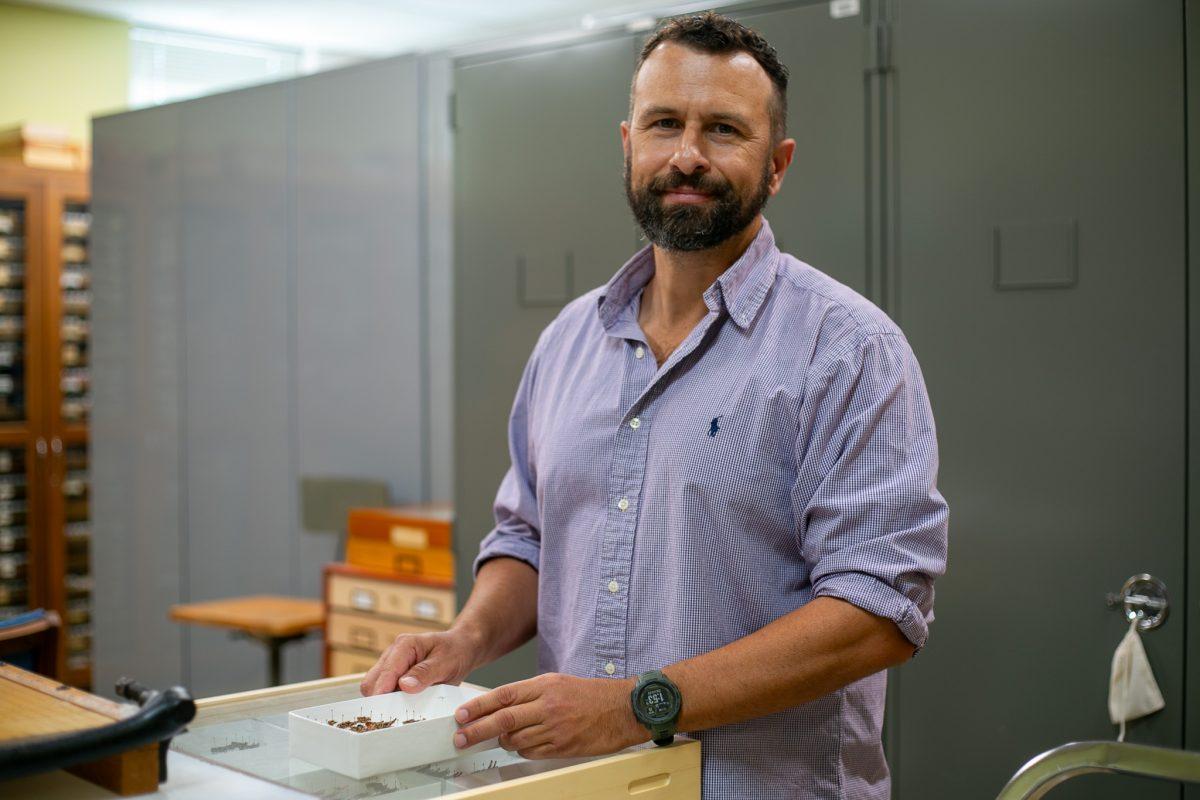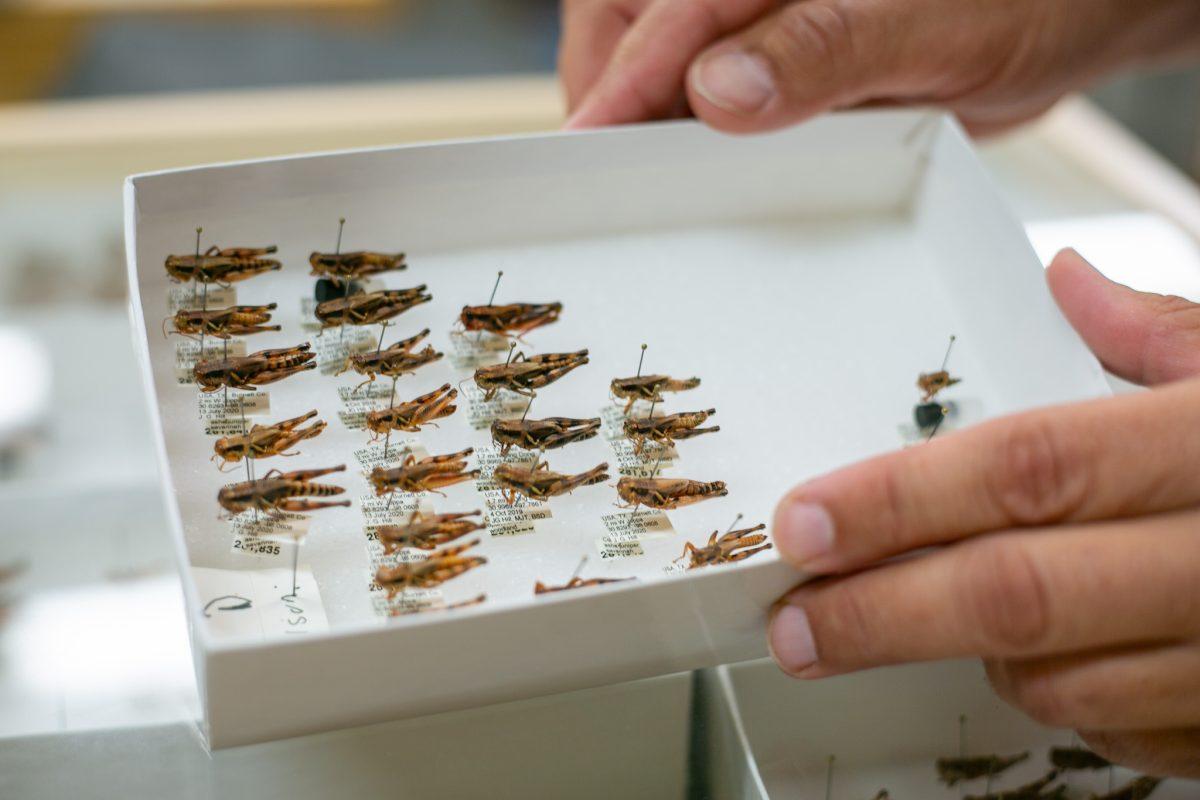Mississippi State University entomologist JoVonn Hill discovered seven new species of grasshopper in Central Texas.
JoVonn Hill, MSU assistant professor and director of the Mississippi Entomological Museum, travels around the U.S. collecting and studying grasshoppers. Earlier this year, Hill published an article documenting his discovery of some new grasshopper species in an area of Central Texas known as the Hill Country.
Between 2018 and 2022, Hill took multiple trips to the Texas Hill Country to collect and study the region’s grasshoppers. Over time, Hill noticed that some of the grasshoppers he collected were unlike the others.
Hill said the grasshoppers’ reproductive characteristics are what set them apart. The grasshoppers are also flightless. Hill identified seven new species of grasshopper, all of them confined to a small area that is just a few counties wide.
Taxonomist and entomologist Ray Fisher accompanied Hill on his trips to Texas. Fisher said that the Texas Hill Country is an example of an ecological concept known as “endemism”.
“Endemism is when you get a location, like this spot in Texas, where, over and over, researchers go there, and they find weird stuff that’s sort of localized to that one area,” Fisher said.
Fisher said that the ancient geography of the Texas Hill Country helps explain why its wildlife is so unique. The area was once more mountainous than it is today, and different animal species fled to the Hill Country to escape environmental change in their native lands. As a result, the Hill Country contains species that do not live anywhere else on earth.
When it came to naming the species, Hill paid tribute to the grasshoppers’ home region. Hill named one species melanoplusnelsoni after Texas country artist Willie Nelson and another species melanopluswalkeri after Jerry Jeff Walker. Hill said that hours of driving through Texas and listening to local music inspired the names.
Hill named two of the other species after Native American tribes that once inhabited the area. The melanopluscomanche and melanoplustonkawa species are named after the Comanche and Tonkawa tribes.
Brady Dunaway, an MSU alumnus and ecologist for the Mississippi Museum of Natural Science, worked with Hill in Central Texas for a couple of years. Dunaway said that the team’s work of collecting grasshoppers made for long days.
Dunaway said the team would leave their lodging facility early in the morning to drive to a site, and sites could stretch for hundreds of acres. The team sometimes spent hours collecting grasshoppers but would go to other sites where there were very few grasshoppers present.
Taxonomist Fisher said that the researchers had a routine at each site.
“So, we’re out there in the heat with our nets swinging around trying to catch these things, bring them all back to the car, label everything, and then drive back to the next site, which may be hours away, and then try to do the same thing on repeat until it gets dark, or the grasshoppers stop hopping,” Fisher said.
In the evenings, the team’s work was not finished. The researchers would set up a black light to attract insects and would hang up a sheet near the black light. The insects that came to the black light would land on the sheet, and the researchers would study them late into the night.
Dunaway said, despite the hard work, the days were still “fun” as the team got to bond together.
“You just had a lot of camaraderie as well. We were always visiting, and we would cook. So it wasn’t just collecting, it was banter into the nights,” Dunaway said.
Taxonomist Fisher said that he has enjoyed working with grasshoppers more than many of the other animals he has studied.
“Most things it’s really kind of difficult to obtain the creature, and then the real science of it happens obviously back in the lab under a microscope,” Fisher said. “Grasshoppers are so fun to work with, and I’m blown away by how fun it is. You’re out there with a net, and you’re just running after these things that are jumping around.”
Fisher said that it is important to identify new species because most life on earth has not been documented by humans, and an increasing number of undocumented species are going extinct.
Director Hill said that the grasshopper species he discovered in Central Texas are some of those species. Urbanization is destroying the grasshoppers’ natural habitat. Fires in the area have increased the number of cedar trees, creating more shade that kills the grasses and other vegetation the grasshoppers normally eat.
Dunaway believes that it is difficult to protect wildlife without preserving their entire ecosystem. Dunaway said local human communities need to be informed about how to take care of the environment around them to protect species like Hill’s grasshoppers.
Dunaway said that to create more passion for wildlife conservation, people need to get outside and learn more about the wildlife that is around them.
“You can’t have conservation in the future without having a passion to conserve. If people are not out getting their feet wet, then they don’t know what’s worth conserving,” Dunaway said.
Hill’s grasshoppers are currently being stored at the Mississippi Entomological Museum. The museum has an extensive collection of a variety of insect species that are available for researchers to study. Displays from the museum can be viewed by the public in the foyer of the Clay Lyle Entomology Building between 8 a.m. and 5 p.m. on workdays.
Individuals or small groups can schedule a private tour of the museum by contacting Beverly Keasler, outreach coordinator for the Mississippi Bug Blues program. Mississippi Bug Blues is a program led by JoVonn Hill to teach Mississippians about insects, biodiversity and wildlife conservation.
Director JoVonn Hill is especially interested in documenting the biodiversity of grassland habitats.














